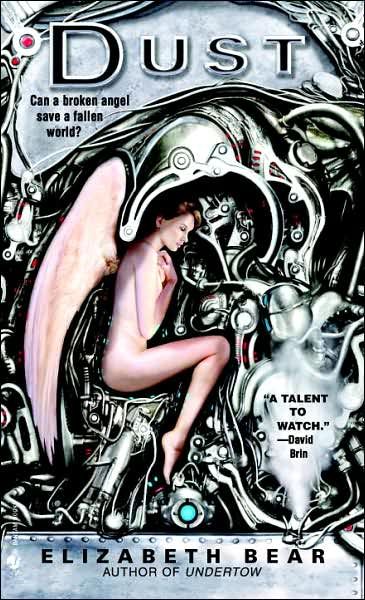Review: Dust by Elizabeth Bear

Title: Dust
Author: Elizabeth Bear
Format: Mass Market Paperback
Pages: 342
Genre: Science Fiction
Publication Date: December 26, 2007
Publisher: Spectra
Rating: B
This book is part of the 2011 Women of Science Fiction book club hosted by Dreams and Speculation.

From Goodreads: On a broken ship orbiting a doomed sun, dwellers have grown complacent with their aging metal world. But when a serving girl frees a captive noblewoman, the old order is about to change....
Ariane, Princess of the House of Rule, was known to be fiercely cold-blooded. But severing an angel’s wings on the battlefield-even after she had surrendered-proved her completely without honor. Captive, the angel Perceval waits for Ariane not only to finish her off-but to devour her very memories and mind. Surely her gruesome death will cause war between the houses-exactly as Ariane desires. But Ariane’s plan may yet be opposed, for Perceval at once recognizes the young servant charged with her care.
Rien is the lost child: her sister. Soon they will escape, hoping to stop the impending war and save both their houses. But it is a perilous journey through the crumbling hulk of a dying ship, and they do not pass unnoticed. Because at the hub of their turning world waits Jacob Dust, all that remains of God, following the vapor wisp of the angel. And he knows they will meet very soon.
In Dust, Bear creates a vast and wonderful society living in large spaceship that is often referred to as the world. Something I didn't know because I am new to hard science fiction is that a generation ship is a known occurrence in the genre. It's a ship that is created and outfitted to last several generations traveling in space, and thus required to sustain its occupants so that when it eventually reaches its destination, the species are still thriving. This is what Bear does except she enhances it with her own flare. She injects medieval-like family intrigue and politics, forced evolution, and religion.
It's quite difficult to get into the complicated dynamics of the world, so I will just highlight some of the things I found most interesting. The ship the story is based around is Jacob's Ladder, once created by a religious cult and has been crippled for hundred of years. The ship's AI has splintered itself into fragment's that specialize in certain functions and come to be known as Angels. The ship carries many species of wildlife in biospheres often called Heavens. The interesting part is that most of the human inhabitants have forgotten or don't know what has happened so their view of the world is altered. The way they govern themselves, I find, is very feudal like, as if society has regressed. There are definite social classes: on the top are the Exalt, the genetic cream of the crop, who have the benefit of symbionts in their bodies to protect against pretty much everything. They also have wings. Another class are the Mean, who don't carry symbionts.
One of the things I liked about Dust is that it has a lot of diversity. It has diversity in range of themes it crosses, in characters, world building and issues. I particularly loved reading about this world. It is so alien and yet familiar that I was mesmerized. Bear also introduces a wide range of characters, from one ungendered to one hermaphrodite, named Mallory. Mallory was a very captivating character who I would have liked to have seen more of.
Another aspect of this book is that Bear includes incestuous relationships, with the idea that because there is no longer any genetic repercussions, it has become more normal. This isn't a huge surprise because we find that many of the characters are actually related to each other.
As for the main characters, there's Rien and her half-sister, Perceval. I liked Perceval more than Rien, for her steadfast determination and her kindness to Rien. I thought Rien herself was often too juvenile for me (okay, she is 15 years old but still).
The only issue I had with this book, unfortunately, kept me from absolutely loving it. That was the way in which Bear takes us into Jacob's Ladder. She doesn't give us much background information and so I spent much of the novel trying to figure things out. This was magnified because of my inexperience in this type of book. However, I did find Bear's prose itself worthwhile and I would like to try out the sequel, Chill.
I would recommend this book to all who want something very different, aren't afraid of tackling a science fiction of this nature, and are open to new ideas. I really enjoyed it and am only disappointed that I couldn't find myself more at ease with the writing.
Next Review: The Sentinel Mage by Emily Gee
xposted to blogspot